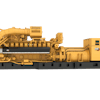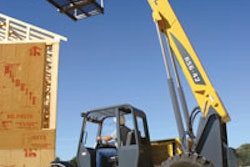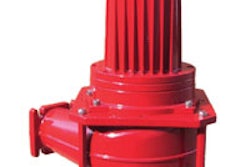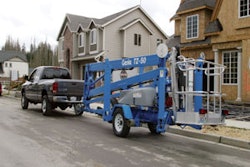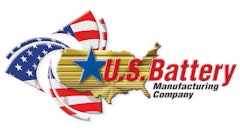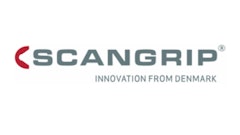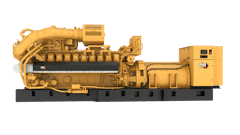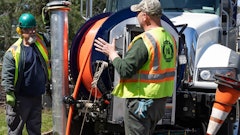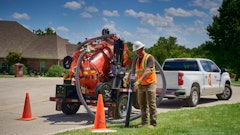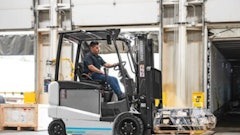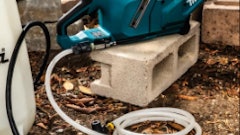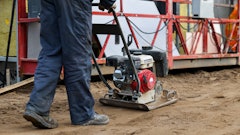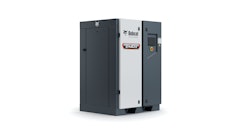For years, PBS and HGTV have planted in the minds of everyday people the idea that they can turn an ugly backyard into an English garden, make a boring bathroom into a luxurious relaxation spot or turn a cobwebbed basement into a hangout for their kids. These gung-ho weekend warriors aren't going to drop thousands of dollars on the equipment necessary to finish these projects, but they will stop by their local rental store looking for the tools a contractor might use, and inevitably, advice from you and your staff.
The DIY market can be very profitable for your company, says Ray Lello of Midwest Construction Rentals.
"The return on investment is about 200 percent annually -you almost double your money with those tools per year," Lello says. "The return is great, in terms of percentages. The dollar return is marginal at first and then gains momentum as you develop your DIY dustomer base. When you buy an excavator you can get $30,000 of return on that in a year, whereas if you buy a Bosch Brute for $1,200, you make $2,200 a year on it. But when you put it in the whole pot together, it's a lot."
Jason Feldner at Bosch Power Tools and Accessories says a rental center should be as welcoming as possible to homeowners. Since deciding to take on a home project can be intimidating for some people, you want to keep your customers at ease when they come to your rental store.
"Rental store owners should make their stores a friendly place, an environment where a DIYer can ask questions," he says.
The typical DIYer needs resources and education. Feldner suggests having videos, tool manuals and knowledgeable staff at your counter willing to help with questions a homeowner might have. Some rental centers go as far as to offer small "how-to" classes where a homeowner might learn how to put a new sink in his bathroom, install a new patio or refinish wood floors.
Today's popular projects
The first step in having a well-stocked DIY inventory is looking at some of the most common projects today's homeowners take on.
"For DIYers, the most popular projects include replacement or upgrade of existing features, rather than totally new construction," says Trey Brown, general manager of power equipment and rental at Makita U.S.A. Inc.
Bathroom and kitchen remodeling projects are ventures the DIYer feels comfortable taking on, such as cutting a hole in a wall to install a breakfast bar, chiseling out old tile or cutting a space in a countertop to drop in a sink. Finishing off a basement and woodworking projects -anything from refinishing wood floors to resurfacing kitchen cabinets to installing new trim -are also very popular with the DIY crowd. Outdoor projects, such as deck and patio construction, tree removal and landscaping are also common.
Tool mix
After drawing up a list of what DIY projects your customers are likely to take on, you need to develop an inventory of tools that can help your customers accomplish those projects. There are certain types of equipment the DIY crowd will feel more comfortable with. Lello says cordless equipment is popular with his DIY customers, and that they're more comfortable working with smaller tools.
"For the DIYers, if they can't pick it up themselves, they don't feel comfortable with it," Lello says. "They feel more comfortable with things that will fit in the trunk of a car or the bed of a pickup truck."
Consider offering several models of the same piece of equipment, depending on how universal the tool is. Two or three units of each model would be a good starting place for a medium-sized, independent rental center, but you might want to have more units available if you suspect a product will be popular. For instance, angle grinders can be equipped with a variety of different discs and used on several different work surfaces, so you might want to have five of them available for rental. Planers and routers, on the other hand, are specific to wood projects and their rental would likely be less often so a smaller number of these items, maybe two of each, would be more practical.
Lello says he keeps an array of small demolition hammers, rotary hammers and combination hammers in stock. They can be used on a variety of home projects like taking up tile, drilling through concrete or other masonry and breaking up small areas of concrete. Lello says the Bosch Brute (he carries six of these for rental) is a hot rental item in his store because it can be used for larger DIY projects such as taking out a small sidewalk or concrete area, and smaller contractor projects.
Other items that many DIYers don't have at home and would be a versatile rental item are smaller rotary hammers and 18-volt and 14.4-volt cordless drills. They can be used for anything from wood and metal applications and assembly projects to light drilling in concrete for hanging address numbers or other similar projects around a house.
Dust containment systems are becoming an increasingly popular rental item. Some woodworking rental tools are equipped with a factory installed dust bag, while other tools require a separate system to control dust. Concrete grinding equipment is also available with dust containment systems, and should be recommended to a homeowner especially if dust suppression with water cannot be accomplished. DIYers are interested in these systems for health reasons and because of cleanliness.
"Dust containment is one of the growing areas that we've spent a lot of money on," Lello says. "Dust containment, especially when you're dealing with people who have an existing house and they're doing repair in it, don't want to get dust through the house and in their air ducts and everything, so they'll pay the extra $30 or $40 a day for the vac attachment for a grinder or saw."
The extras
Just as you would rent tools and sell the consumables to your contractor clients, plan to do the same for your DIY customers.
"Rental centers should provide an array of consumables for each unit offered," Brown says. "Popular accessories are determined by market according to home types, landscape environment and project materials."
Some of the basic consumables you should offer include fastening bits, drill bits, saw blades, sanding disks and sandpaper. Also keep in mind that your DIY market may not be as familiar with or have access to the safety accessories necessary for the projects they plan to take on. Have ear plugs, protective goggles, disposable dust masks, gloves and other necessary safety items on hand for your DIY customers.
Your DIY crowd might need extra attention when it comes to safety. Lello says insurance is his second highest cost after payroll expenses, but he says his store's prevention efforts have paid off in lowering his rates.
"If someone rents a chain saw, we have a video they watch and a kit that has earmuffs and chaps in it. We go over with them why they have to take the kit with them," he says.
Make sure your employees explain how each tool works and how to operate it safely.
"Proper safety and operation should always be explained to each renter," Brown says. "Additionally, related printed material should be made available for customer reference at the time of operation."
Since DIYers are not as familiar with construction tools or projects as your other customers are, or may feel intimidated at the thought of taking on a home remodeling project, they need support and encouragement. But patience and expertise on the part of your workers can lead to a strong and profitable relationship with your DIY customers.
"The DIYers take a lot more of our time than other customers do, but there also seems to be a lot of residual business with them," Lello says. "They'll use us from the beginning to the end of a job -they'll use the whole spectrum of tools from doing excavation work to painting, so they'll rent everything from a mini-backhoe to an airless sprayer to finish an addition."


